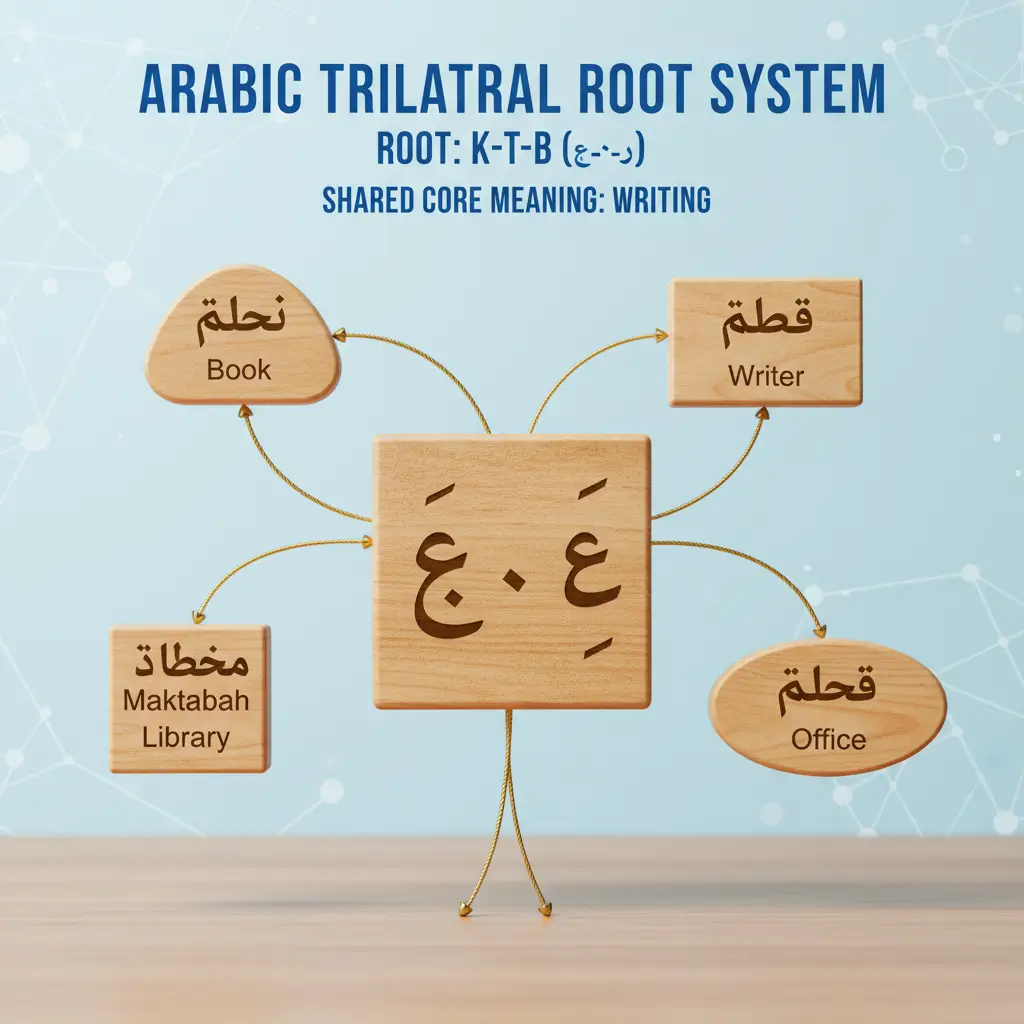
🌟 Introduction: The Right Start Changes Everything
Learn Arabic for Beginners trendy story : Lisa tried learning Arabic twice. First attempt: Downloaded Duolingo, bought advanced textbook, watched random YouTube videos. Result after 2 months: confused, frustrated, ready to quit.
Second attempt: Followed proper beginner path—alphabet first (6 weeks), then pronunciation, then basic grammar. Result after 6 months: reading Arabic fluently, writing sentences, understanding conversations, 500 words.
The difference? Starting right. Proper foundations. Clear progression.
This guide provides complete beginner roadmap: realistic expectations, where to start, step-by-step plan, essential resources, common mistakes, and proof that yes—you can learn Arabic.
For Arabic Language foundation, see Arabic Language (Fusha) Guide.
🤔 Is Arabic Really That Hard?
Honest answer: Yes, Arabic is objectively difficult for English speakers (FSI Category IV—2,200 hours vs 600 for Spanish).
Why it’s challenging:
- New alphabet (28 letters, 4 forms each, right-to-left)
- Unfamiliar sounds (ع، ح، خ، غ، ق)
- Complex grammar (root patterns, gender, case system)
- Fusha vs dialects confusion
BUT—here’s the good news:
Arabic is systematic and learnable:
- Alphabet logical (6-8 weeks to master)
- Grammar predictable (complex but regular patterns)
- Abundant resources (courses, apps, tutors widely available)
- Strong motivation advantage (religion, career, heritage)
- Millions of non-natives have learned it successfully
Realistic Beginner Timeline (60 min/day):
| Timeline | Achievement |
|---|---|
| Week 4 | Alphabet mastery, read simple words |
| Month 3 | Read voweled texts, 300 words, basic grammar |
| Month 6 | Elementary proficiency—800 words, write paragraphs, basic conversations |
| Month 12 | Upper elementary—1,500 words, read children’s books, write emails |
Key: Arabic takes time (2-4 years to advanced) but beginner progress is visible and rewarding.
For addressing concerns, see Is Arabic Hard to Learn?.
🎯 Where Beginners Should Start (The Right Foundation)

❌ Wrong Starts (Common but Ineffective):
- Jumping to conversations without alphabet
- Learning transliterated phrases (“marhaba” instead of مرحبا)
- Random YouTube videos with no structure
- Advanced materials (Quran, news) as beginner
✅ The Right Beginner Foundation:
Phase 1: Alphabet (Weeks 1-6)
- All 28 letters in 4 forms
- Short vowels (fatha, kasra, damma)
- Reading voweled words fluently
- Why first: Everything builds on this. No shortcuts.
Phase 2: Pronunciation (Weeks 7-8)
- Arabic-specific sounds with native teacher
- Record yourself, compare to natives
- Why now: Early correction prevents fossilization
Phase 3: Essential Vocabulary (Weeks 7-12)
- First 100-300 words (greetings, numbers, common nouns/verbs)
- Spaced repetition (Anki, Memrise)
- Why parallel: Need words to practice grammar
Phase 4: Elementary Grammar (Weeks 9-16)
- Sentence structure, present tense, basic pronouns
- Nominal vs verbal sentences
- Why after alphabet: Need reading ability to study grammar
Complete Foundation (4 months, 5-7 hrs/week): ✅ Read/write Arabic fluently ✅ Pronounce correctly ✅ 300-500 word vocabulary ✅ Basic grammar mastery ✅ Read simple texts, write sentences ✅ Ready for intermediate material
For alphabet mastery, explore Best Way to Learn Arabic Alphabet. For structured starting, see How to Start Learning Arabic.
📝 7 Steps for Complete Beginners
Step 1: Define Your “Why” and Set Goals
Why are you learning Arabic?
- Religious (Quran)
- Professional (work)
- Heritage (family)
- Academic (research)
- Personal (culture/travel)
Set specific 6-month goal:
- ❌ Vague: “Learn Arabic”
- ✅ Specific: “Read simple texts, write basic sentences, 500-word vocabulary, understand common phrases”
Your “why” sustains you when difficult.
Step 2: Choose ONE Quality Resource
Don’t collect 10 resources—choose one, commit 3 months.
Options:
- Structured Online Course ($200-600) – guided progression, teacher support
- Quality Textbook (Al-Kitaab, $50) – comprehensive, self-study
- Beginner App (Duolingo, free) – supplement only, insufficient alone
- Private Tutor ($20-50/hr) – personalized, most expensive
Recommendation: Textbook + monthly tutoring = structure + feedback at reasonable cost
For course options, see Arabic for Beginners Course.
Step 3: Master the Alphabet (Non-Negotiable)
Dedicate 4-8 weeks to alphabet mastery. Don’t rush.
Daily practice (45-60 min):
- 20 min: Letter recognition/forms
- 15 min: Writing practice
- 15 min: Reading practice
- 10 min: Review
Alphabet Mastery Checklist:
- [ ] Recognize all 28 letters instantly
- [ ] Read letters in all positions
- [ ] Write correctly from memory
- [ ] Read voweled words fluently
Only after this → move to grammar.
Step 4: Develop Correct Pronunciation
Arabic sounds challenging for English speakers: ع، ح، خ، غ، ق، ص، ض، ط، ظ
How to master:
- Watch native speaker videos (mouth position)
- Listen and repeat exactly
- Record yourself, compare to native model
- Get feedback from teacher/native speaker
Critical: Fix pronunciation early. Bad habits as beginner = permanent fossilization.
Step 5: Build Essential Vocabulary (500 Words)
Learn vocabulary correctly:
✅ In context (sentences, not lists)
✅ Spaced repetition (review at intervals)
✅ Audio + text (pronunciation + spelling)
✅ Thematic groups (family, food, etc.)
✅ Use immediately in writing/speaking
First 500 words categories:
- Greetings (50), Numbers (50), Family (50)
- Common verbs (100), Daily objects (100)
- Questions/basics (50), Pronouns (50)
- Adjectives (50)
Tools: Anki, Memrise, Drops
Step 6: Learn Grammar Systematically
Beginner grammar progression:
Month 3: Present tense, nominal sentences, basic negation Month 4: Past tense, questions (what, where, when) Month 5: Future tense, possessives (my, your), prepositions Month 6: Review all grammar, longer sentences, paragraphs
How to study:
- One concept at a time
- Lots of examples
- Practice exercises
- USE it in writing/speaking
For step-by-step guide, see Learn Arabic Step by Step: 2025 Guide.
Step 7: Practice All Four Skills Daily
Balanced 60-minute daily practice:
📖 Reading (20 min): Voweled texts, read aloud ✍️ Writing (15 min): Copy, then write own sentences 👂 Listening (15 min): Beginner audio with transcripts 🗣️ Speaking (10 min): Repeat after audio, describe pictures
All four from beginning. Don’t neglect any skill.
🗓️ First 30 Days Roadmap

Week 1: Letters 1-7 (أ→خ) | 60 min/day Week 2: Letters 8-14 (د→ص) | 60 min/day Week 3: Letters 15-21 (ض→ق) | 60 min/day Week 4: Letters 22-28 (ك→ي) + vowels | 60 min/day
End of Month 1:
✅ Complete alphabet mastery
✅ Reading voweled words
✅ 50 basic words
✅ Ready for grammar
⚠️ Common Beginner Mistakes
1. Rushing alphabet (1 week) → weak foundation forever Solution: Dedicate full 6-8 weeks
2. Ignoring writing practice → poor recognition Solution: Hand-write 15 min daily
3. Learning silently → can’t speak when trying Solution: Speak from Day 1, read aloud
4. No clear goals → no direction, easy to quit Solution: Specific 3-month, 6-month goals
5. Collecting resources, using none → analysis paralysis Solution: Choose ONE, stick 3 months minimum
For comprehensive beginner guide, see How to Learn Arabic for Beginners.
🌟 Success Story: Zero to Reading in 4 Months

Ahmed, 24, American Muslim: Wanted Quran understanding. Zero Arabic knowledge.
His approach:
- Month 1: Alphabet only (60 min/day)
- Month 2: Pronunciation with tutor + 150 words
- Month 3: Al-Kitaab Part 1, present tense, writing daily
- Month 4: Reading Quranic verses, children’s Islamic stories
Investment: $300 (course $50, textbook $50, tutoring $200)
Result after 4 months: ✅ Reading Quran 40% comprehension ✅ 400-word vocabulary ✅ Writing simple sentences ✅ From zero to functional beginner
His advice: “Alphabet felt long and boring. I wanted to skip to Quran. But solid alphabet made everything easier. Month 4 I was reading Quran—impossible Month 1. Practice EVERY DAY even 30 min on busy days.”
📚 Essential Beginner Resources
Free:
- YouTube: ArabicPod101, Learn Arabic with Maha
- Apps: Duolingo, Memrise, Drops
- Websites: ArabicOnline.eu, Madinah Arabic
Paid (Worth It):
- Courses: Alphabet Arabic Academy ($350-600/6 months)
- Textbooks: Al-Kitaab ($50), Mastering Arabic ($40)
- Tutoring: iTalki, Preply ($15-30/hour)
Related Guides:
📖 Best Way to Learn Arabic Alphabet – alphabet mastery guide
🎯 How to Start Learning Arabic – complete starting guide
📚 Arabic for Beginners Course – course comparisons
📝 Learn Arabic Step by Step: 2025 Guide – month-by-month roadmap
❓ Is Arabic Hard to Learn? – honest difficulty assessment
💻 Online Arabic Course for Beginners – online options
📖 How to Learn Arabic for Beginners – complete methodology
📚 Arabic Language (Fusha) Guide – essential foundation
❓ FAQ for Beginners
Q: How long to learn Arabic as beginner? A: Beginner proficiency (alphabet, basic grammar, 500 words): 3-6 months (5-7 hrs/week). Intermediate: 12-18 months. Advanced: 24-36 months.
Q: Fusha or dialect? A: Most beginners: Start Fusha (standardized, enables reading/writing, works everywhere). Exception: moving to specific country needing survival dialect.
Q: Need a teacher? A: Possible without but much harder. Teachers provide: pronunciation correction, grammar explanations, speaking practice, accountability. Optimal: textbook + monthly tutoring.
Q: Minimum daily time? A: 30 min minimum to see progress. 60 min optimal for beginner proficiency in 6 months. Consistency > duration.
Q: Is alphabet really that hard? A: No—6-8 weeks to master with daily practice. Unfamiliar but logical. Don’t rush—solid foundation worth the time.
Q: All four skills together? A: Yes, but emphasis reading/writing first 3 months (alphabet foundation). After alphabet, add increasing speaking/listening. Month 4+ balance all four.
Q: How much does it cost? A: Free (apps/YouTube) to $2,400 (private tutoring 6 months). Most effective for beginners: textbook + monthly tutoring = ~$200 for 3 months.
Q: Tried before and quit. Start over? A: Don’t restart completely. Assess what you retained, resume with review. Past failure often due to: no structure, too hard materials, no consistency. This time: structured program, daily practice, realistic goals.
🏆 Alphabet Arabic Academy Beginner Program
6-Month Beginner Track:
Months 1-2: Alphabet & Pronunciation – fluent reading/writing Months 3-4: Elementary Grammar & 500 words – basic communication Months 5-6: Reading & Writing practice – solid beginner proficiency
What’s Different: ✅ Beginner-specific curriculum (proper pacing) ✅ Native Arab teachers (correct pronunciation) ✅ Small classes (max 6 students, same level) ✅ Daily practice materials (homework, audio, flashcards) ✅ Progress tracking (bi-weekly quizzes, monthly assessments)
Investment:
- Group: $350/month × 6 = $2,100
- Private: $600/month × 6 = $3,600
- Includes: 3 classes/week, all materials, unlimited support
🎯 Start Your Journey Today

This Week:
- Clarify your goal (why Arabic? 6-month specific goal)
- Choose ONE resource (course, textbook, app+tutor)
- Gather materials (notebook, flashcards, audio capability)
- BEGIN (Day 1 of alphabet, 60 minutes, track it)
Month 1: Alphabet mastery (60 min/day) Months 2-3: Grammar & vocabulary (60 min/day, 50 words/week) Months 4-6: Four skills practice (reading, writing, listening, speaking)
Result: Functional beginner in 6 months.
💭 Conclusion: Every Expert Was Once a Beginner
Arabic seems impossible from outside. Unfamiliar alphabet, complex grammar, difficult sounds.
But every Arabic speaker—native or learned—started knowing zero.
Lisa couldn’t recognize alphabet in January. By July, reading and writing. Ahmed went from zero to reading Quran in 4 months.
You can do this.
Success requires:
- Proper foundations (alphabet before conversations)
- Systematic progression (beginner → elementary → intermediate)
- Consistent daily practice (60 min daily)
- Realistic expectations (6 months to beginner, not “fluent in 3”)
- Not quitting when hard (difficulty is normal)
Your beginner journey begins when you decide to start.
Not when perfect conditions. Not when more time. Not when less intimidating.
Today.
Six months from now, you’ll read Arabic, write sentences, understand speech, hold conversations.
But only if you start.
🚀 Ready to begin?
Free consultation, assessment, trial lesson—zero obligation.
🎁 Mention this guide for beginner starter package
Every expert was once where you are. Begin today.
بسم الله – In the name of Allah.
About The Author
Mr. Abdelrahman is an Arabic Language Instructor with over 8 years of experience teaching Modern Standard Arabic and Quranic Arabic to non-native speakers at Alphabet Arabic Academy.
Need help? write your massage here

